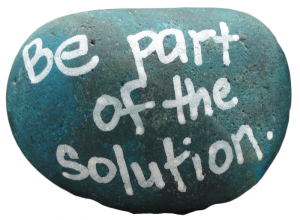 I was talking to an employee of a local retail establishment several years ago. She was a nice woman, and she had some fairly strong opinions about how a local festival event should be run. She was singing a normal refrain in these types of conversations. Sing it with me: “They should…” “They should make the hours longer.” “They should promote it more.” “They should have more food.” “They should have more dates.” Ironically, I had just come from a meeting about this event. So after about 5 minutes of listening patiently I said, “I am a part of ‘THEY.” We are starting a group called ‘WE.’ And ‘YOU’ are welcome to be a part of it.” She didn’t understand at first. So I explained that this group was not an exclusive club. It wasn’t happening in a dark secret room. It was a gathering of unpaid volunteers that could use some help. She could become “they.” I have never talked to her again. That’s how it works so often. There are those that have lots of loud suggestions. And there are those that “do.” She was a nice person and had some interesting ideas. But the moment someone mentioned that she might have to execute on them, she went missing. The problem with the word “they” is it is victim thinking. If we can blame someone else, then it can’t be our fault. If someone is holding is back, it’s not worth trying. And if we don’t try, we can’t fail. But the moment we join the fight, it might not work. So it’s easier to blame. It’s easier to wait for “they” to fix it. Here’s the thing…”they” are not going to fix your situation, your community or your life. And here’s the other thing…it’s not their job. It’s yours. Here’s a question to ask instead: “What can I do?” In almost any area, you can do something to improve a situation. Whether it’s your community, your fitness, your career or your relationships, you have the ability to do something. Figure out a way to decrease the distance between “I can” and “I do.” And stop blaming “they.” It’s up to you. Make sure you never miss an update. Sign up for our VIP newsletter today!
I was talking to an employee of a local retail establishment several years ago. She was a nice woman, and she had some fairly strong opinions about how a local festival event should be run. She was singing a normal refrain in these types of conversations. Sing it with me: “They should…” “They should make the hours longer.” “They should promote it more.” “They should have more food.” “They should have more dates.” Ironically, I had just come from a meeting about this event. So after about 5 minutes of listening patiently I said, “I am a part of ‘THEY.” We are starting a group called ‘WE.’ And ‘YOU’ are welcome to be a part of it.” She didn’t understand at first. So I explained that this group was not an exclusive club. It wasn’t happening in a dark secret room. It was a gathering of unpaid volunteers that could use some help. She could become “they.” I have never talked to her again. That’s how it works so often. There are those that have lots of loud suggestions. And there are those that “do.” She was a nice person and had some interesting ideas. But the moment someone mentioned that she might have to execute on them, she went missing. The problem with the word “they” is it is victim thinking. If we can blame someone else, then it can’t be our fault. If someone is holding is back, it’s not worth trying. And if we don’t try, we can’t fail. But the moment we join the fight, it might not work. So it’s easier to blame. It’s easier to wait for “they” to fix it. Here’s the thing…”they” are not going to fix your situation, your community or your life. And here’s the other thing…it’s not their job. It’s yours. Here’s a question to ask instead: “What can I do?” In almost any area, you can do something to improve a situation. Whether it’s your community, your fitness, your career or your relationships, you have the ability to do something. Figure out a way to decrease the distance between “I can” and “I do.” And stop blaming “they.” It’s up to you. Make sure you never miss an update. Sign up for our VIP newsletter today!

